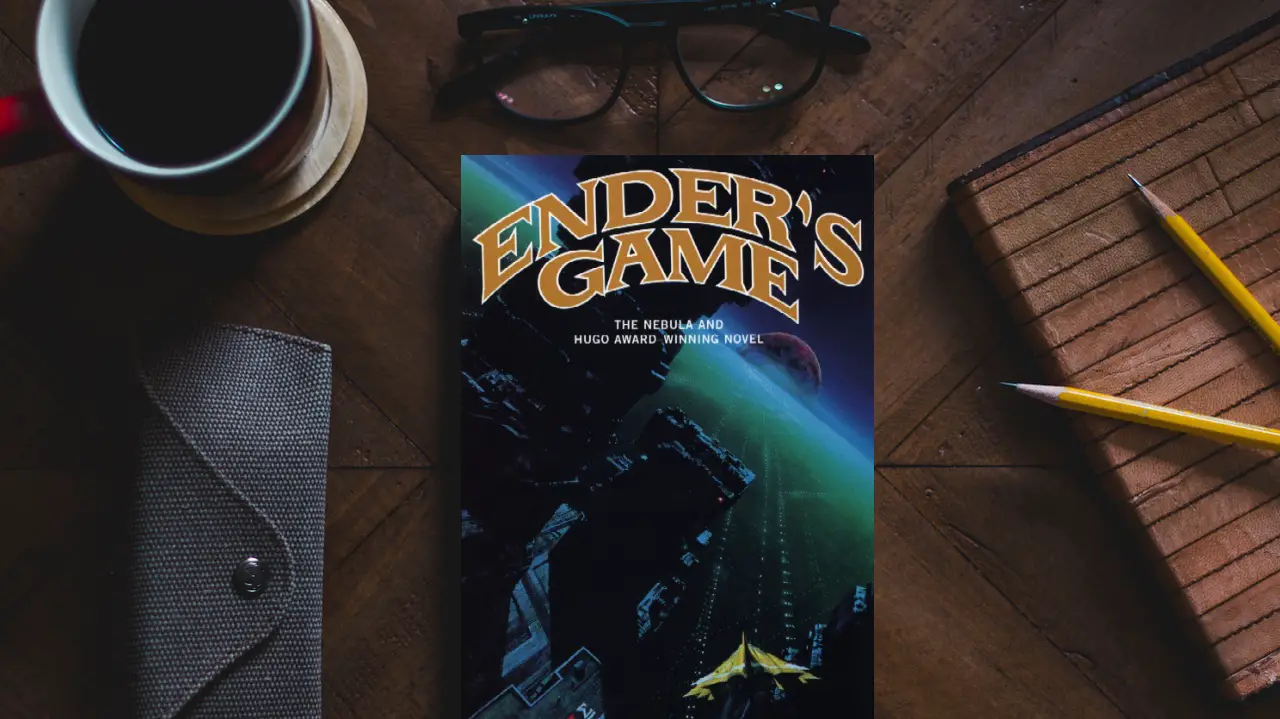This post contains affiliate links.
Far and away, Science Fiction is my favorite genre to write. However, when it comes to reading Sci-fi, there’s a lot of…weird stuff out there. Not only that, but much of it is cliche or soaked to the bone in Humanism.
Because of this, my experience reading Sci-fi has been a mixed bag. That being said, Ender’s Game was definitely one of the gems.
I stumbled upon Ender’s Game after reading a book on writing Science Fiction by the same author, Orson Scott Card.
Through reading his “how to” book, I discovered that Card himself had written an award winning Science Fiction novel, or rather, a series of novels: the Ender’s Game Series. I decided I wanted to read this Ender’s Game book. That way, I could see if Mr. Card really knows what he’s talking about.
Does Orson Scott Card really know how to write a Science Fiction novel? He does.
Ender’s Game is easily one of my favorite books, which makes it my pleasure to share with you this excellent review by Kingdom Pen subscriber, Corey Poff. For more reviews and insights, check out Corey’s blog: The Ink Slinger
Reagan Ramm
Ender’s Game: A Book Review
Synopsis
In the futuristic world of Ender’s Game, an alien race has attacked Earth twice and almost destroyed mankind.
To prepare for the next encounter, an international Battle School has been established, where the world’s most talented children are drilled in the arts of war. Their early training takes the form of “games”: simulated battles in null-gravity.
Enter Andrew “Ender” Wiggin: a genius among geniuses. His training begins at age six, and when he joins Battle School, his tactical prowess becomes obvious.
With humanity’s survival in the balance, everything hinges on Ender’s ability to surmount every challenge he’s given. The authorities are determined to make him or break him. Ender will grow up fast.
Review
As far as science fiction goes, Ender’s Game isn’t good, nor is it great – it’s brilliant. Winner of the Hugo and the Nebula awards, this bestselling novel by Orson Scott Card is a stellar fusion of action and ideas; a story as intellectually challenging as it is relentlessly entertaining.
Card’s prose is of the clear, clean-cut variety, in the tradition of George Orwell, who said that good writing is “like a windowpane.” He doesn’t draw attention to himself as the author; instead, he steps aside and focuses on enveloping the reader in Ender’s world.
Crisp dialogue. Taut pacing. Meticulous world-building. Tremendous characterization. What’s not to like about the way this book is written?
The action sequences are absolutely thrilling. In some ways, they reminded me of the zero-gravity combat in Inception (2010), except on a grander and more sophisticated scale. Excitingly-rendered as these sequences are, however, it’s the rendering of the characters that ultimately makes Ender’s Game as good as it is.
This is especially true in the case of Ender himself: since much of the story consists of his own internal dialogue, it’s crucial that we feel a strong emotional connection with him.
Card accomplishes this perfectly, making Ender a well-developed and wonderfully sympathetic little hero. We get inside his head, feel him struggle, feel him triumph. We know him. And because of this, his growth in the harsh arena of Battle School is both compelling and painful to watch.
The Theme
Ender’s Game is home to a multitude of tough and interesting ideas. Exploitation of children. Lost innocence. Abuse of power. Self-sacrifice. Personal responsibility. Family. And the war-time balance between ruthlessness and compassion.
You may not agree with everything in the way Card handles these ideas, but he deserves credit for making us grapple with them in the first place.
Of course, Card isn’t touting a distinctly Christian worldview, and readers should keep that in mind.
There’s a bit of quasi-religious weirdness at the very end (it’s brief and hardly central to the story), as well as a smattering of crude language, some violence, and quite a few mature themes.
Don’t let the hero’s age fool you: this is no children’s book.

